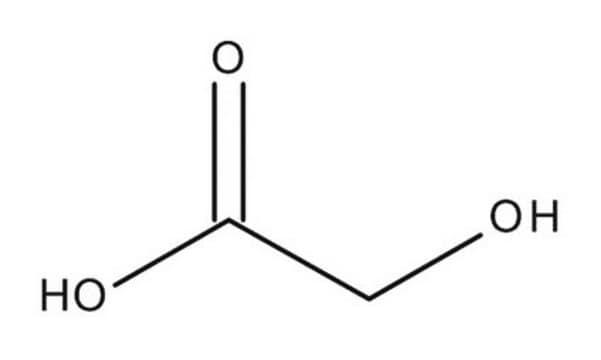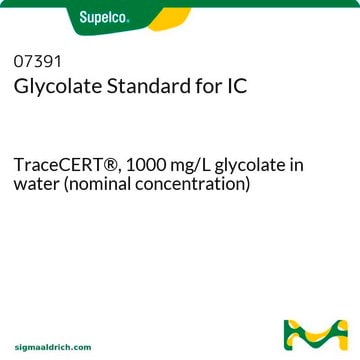94815
Glycolic acid
certified reference material, TraceCERT®, Manufactured by: Sigma-Aldrich Production GmbH, Switzerland
Synonyme(s) :
Hydroxyacetic acid
About This Item
Produits recommandés
Qualité
certified reference material
TraceCERT®
Niveau de qualité
Durée de conservation
limited shelf life, expiry date on the label
Fabricant/nom de marque
Manufactured by: Sigma-Aldrich Production GmbH, Switzerland
Conditions de stockage
under inert gas (Argon)
Technique(s)
HPLC: suitable
gas chromatography (GC): suitable
Pf
75-80 °C (lit.)
Application(s)
cleaning products
cosmetics
food and beverages
personal care
Format
neat
Température de stockage
2-8°C
Chaîne SMILES
OCC(O)=O
InChI
1S/C2H4O3/c3-1-2(4)5/h3H,1H2,(H,4,5)
Clé InChI
AEMRFAOFKBGASW-UHFFFAOYSA-N
Vous recherchez des produits similaires ? Visite Guide de comparaison des produits
Description générale
Certified content by quantitative NMR incl. uncertainty and expiry date are given on the certificate.
Download your certificate at: http://www.sigma-aldrich.com.
Application
Conditionnement
Informations légales
Mention d'avertissement
Danger
Mentions de danger
Classification des risques
Acute Tox. 4 Inhalation - Eye Dam. 1 - Skin Corr. 1B
Code de la classe de stockage
8A - Combustible corrosive hazardous materials
Classe de danger pour l'eau (WGK)
WGK 1
Point d'éclair (°F)
>572.0 °F - (decomposition)
Point d'éclair (°C)
> 300 °C - (decomposition)
Faites votre choix parmi les versions les plus récentes :
Déjà en possession de ce produit ?
Retrouvez la documentation relative aux produits que vous avez récemment achetés dans la Bibliothèque de documents.
Les clients ont également consulté
Notre équipe de scientifiques dispose d'une expérience dans tous les secteurs de la recherche, notamment en sciences de la vie, science des matériaux, synthèse chimique, chromatographie, analyse et dans de nombreux autres domaines..
Contacter notre Service technique













